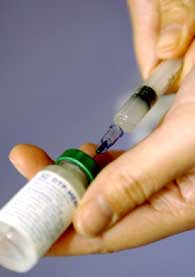 Currently, in major cities, people are rushing to get vaccinated against the flu. Many believe that receiving this vaccine will prevent them from contracting avian influenza, while others assert that the vaccination merely provides peace of mind and protects against seasonal flu.
Currently, in major cities, people are rushing to get vaccinated against the flu. Many believe that receiving this vaccine will prevent them from contracting avian influenza, while others assert that the vaccination merely provides peace of mind and protects against seasonal flu.
We spoke with Pharmacist Nguyen Thi Huong – Head of the Pharmacy Department at Viet Phap Hospital, Hanoi, to gather essential information about this vaccine.
What is Vaxigrip?
Vaxigrip is a flu vaccine for the strains of 2005/2006. It is a pre-filled 0.5 ml injectable suspension available in either a syringe or a 0.5 ml vial. This vaccine, named VAXIGRIP, is produced by the pharmaceutical company Aventis Pasteur in France and has been approved for use by the Ministry of Health of Vietnam.
This vaccine is used to prevent influenza, especially in individuals at high risk for complications.
Does Vaxigrip protect against H5N1 influenza?
This vaccine protects against three common flu strains prevalent in 2005 and 2006. Since influenza is known to change seasonally, it is best to get vaccinated annually, either at the beginning of autumn in temperate climates or at the onset of the flu season in tropical areas.
* Regarding H5N1 influenza: If an individual contracts a common flu at the same time as an H5N1 outbreak, the seasonal flu virus may combine with H5N1 to form a new strain capable of human-to-human transmission. Therefore, receiving the Vaxigrip vaccine can reduce the chances of different flu viruses merging, thus minimizing the potential for an outbreak. Additionally, Vaxigrip vaccination allows doctors to quickly identify the strain of flu, as those vaccinated are unlikely to contract the flu.
When should Vaxigrip not be administered?
You should avoid vaccination if you:
– Are allergic to any active ingredients or excipients in the vaccine, eggs, chicken protein, neomycin, formaldehyde, or octoxinol-9.
– Have a fever due to illness or an acute infection (in this case, it is best to postpone vaccination until you have fully recovered).
What should be considered before and after vaccination?
You should exercise caution and inform your doctor if you have an immune deficiency, allergies, or any unusual reactions after previous vaccinations (especially in young children).
Pregnant or breastfeeding women should only receive this vaccine under the advice of a physician.
For individuals who frequently drive or operate machinery: There is currently no definitive evidence that the vaccine affects driving or machine operation capabilities. It is best to have a thorough examination by a doctor and follow their recommendations for each specific case.
After vaccination, you should rest for 5 to 10 minutes to prevent dizziness.
If a child is due for other vaccinations, will Vaxigrip affect those vaccines?
Vaxigrip can be administered simultaneously with other vaccines, but they must be injected at different sites.
If you or your child are ill, inform your doctor or pharmacist of any treatments or medications you are taking, including over-the-counter drugs.
How strictly should the Vaxigrip vaccination guidelines by age be followed?
Regarding dosage: Adults and children over 36 months should receive one dose of 0.5 ml; children aged 6 to 35 months should receive a dose of 0.25 ml.
Regarding the number of doses: For children under 8 years who have not been previously vaccinated, a second dose should be administered at least 4 weeks after the first dose. For those 8 years and older, only one dose is necessary.
The vaccine should only be injected intramuscularly or subcutaneously; it must never be injected into a blood vessel.
Does Vaxigrip have side effects?
Like other medications, Vaxigrip can cause side effects. Clinical studies have shown that common side effects include:
Local reactions: redness, swelling, pain, bruising, hard lumps.
Systemic reactions: fever, malaise, shivering, fatigue, headache, sweating, muscle pain, joint pain.
These reactions typically resolve on their own within 1-2 days without treatment.
When monitoring the vaccine’s distribution, experts have noted the following uncommon side effects:
Uncommon: Systemic skin reactions including itching, hives, or rash.
Storage issues for Vaxigrip
When going for vaccination, you should be aware of whether the vaccine has been stored and handled according to standards. This vaccine requires careful storage: it must be kept in a refrigerator at temperatures between +2°C and +8°C, protected from light, not frozen, and should not be used if it has changed color or contains foreign particles. It should not be used past the expiration date indicated on the label or packaging.
Therefore, according to Pharmacist Huong, you should not purchase the vaccine and ask someone else to administer it. Vaccines are very sensitive; during transport from the pharmacy to your home, the vaccine may be compromised without your knowledge. Administering a compromised vaccine could be very dangerous.
Vaccination should be conducted at reputable hospitals and healthcare facilities, as only these locations can provide medications that are properly stored, maintained, and comply with the standards and guidelines set by the manufacturer and the Ministry of Health of Vietnam.
Kieu Nga – An Cuong.


















































